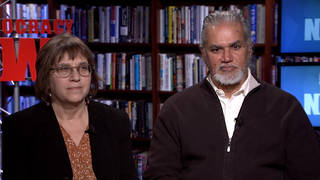HeadlinesJanuary 13, 2014
West Virginia Residents Face 5th Day Without Tap Water
Hundreds of thousands of West Virginia residents are on their fifth day without safe tap water after a chemical spill in the Elk River. The company Freedom Industries leaked up to 7,500 gallons of an agent used in coal extraction on Thursday. Residents have been barred from drinking, cooking or bathing with water from their taps. Scores of schools and businesses have been closed, including in the state capital, Charleston. The head of the West Virginia Water Company told residents to only use water for flushing toilets.
Jeff McIntyre: “Right now, no water is safe. Hot or cold water all starts as cold water that comes from our treatment plant. So, under the do not use, as the governor mentioned, do not use it for anything other than sanitation.”
Dozens of people have been hospitalized since the spill, with symptoms including nausea, vomiting, dizziness, diarrhea, rashes and reddened skin. On Sunday, West Virginia Gov. Earl Ray Tomblin said the amount of chemicals in the water is on the decline, but offered no timeline on when it will be safe.
West Virginia Gov. Earl Ray Tomblin: “The numbers look good, and like last night, they are very encouraging. I believe that we’re at a point where we could say that we see light at the end of the tunnel.”
No Inspections at West Virginia Plant Behind Chemical Leak Since 1991
Environmental inspectors have not visited the Freedom Industries facility behind the West Virginia chemical spill since 1991. Under West Virginia law, chemicals storage facilities are not even subject to inspections. The chemical, known as MCHM, does not receive close federal or state oversight. The plant also had no groundwater protection plan in place.
U.S. Unemployment Rate Drops, But Job Growth Lags
The official U.S. unemployment rate has fallen to 6.7 percent, its lowest point since October 2008. But new figures released on Friday show the economy added just 74,000 jobs last month, less than half of what had been expected. In his weekly address, President Obama vowed to focus on creating new manufacturing jobs and renewed his call for Congress to extend benefits for the unemployed.
President Obama: “Congress needs to finish the job right away. More than one million Americans across the country will feel a little hope right away, if they do. Working folks are looking for the kind of stable, secure jobs that went overseas in the past couple of decades. So, next week I’ll join companies and colleges and take action to boost the high-tech manufacturing that attracts the kind of good new jobs a growing middle class requires.”
Farm Bill Could Cut $9 Billion in Food Stamps; Majority of Congress are Millionaires
The Senate is continuing negotiations on whether to extend the jobless benefits that expired last month. But talks appear to have hit an impasse with Republicans demanding an equal amount in cuts to government spending. Lawmakers are also negotiating over a new farm bill that will reportedly cut another $9 billion from food stamps over the next decade. The cuts would deprive more than 800,000 households of up to $90 in aid per month. That comes on top of the $5 billion in food stamp cuts imposed last year. As lawmakers seek to reduce aid for the poor and unemployed, a new study says that for the first ever a majority of U.S. congressmembers are millionaires. According to the Center for Responsive Politics, at least 268 of 534 members of Congress were worth an average of $1 million in 2012.
Iran Nuclear Deal to Take Effect With Sanctions Relief
Iran’s interim nuclear deal will take effect a week from today after being finalized with six world powers, including the United States. The two sides agreed to a timeline for implementation on Sunday after reaching the agreement in November. Iran will receive partial sanctions relief in return for slowing nuclear operations and capping uranium enrichment at 5 percent. Speaking in Paris, Secretary of State John Kerry said the ensuing talks to reach a final agreement will be a far greater challenge.
Secretary of State John Kerry: “We are very clear-eyed about the even greater challenges that we face in negotiating a comprehensive agreement. We understand it’s going to be a tough negotiation, and we are very clear about what will be required in order to be able to guarantee to the international community that this is a peaceful program. The negotiations will be very difficult, but they are the best chance that we have to be able to resolve this critical national security issue peacefully and durably.”
As part of the agreement, Iran will receive sanctions relief worth up to $7 billion. An initial installment of $550 million in frozen oil revenue will be released next month.
Syrian Opposition Undecided as Geneva Talks Near
An international peace conference for Syria is set to begin next week in Geneva. But the summit remains in doubt as Syrian opposition groups have yet to confirm their attendance. The main exile group, the Syrian National Coalition, has postponed a vote until later this week amidst continued internal disputes. On Sunday, Secretary of State John Kerry said he expects the opposition’s involvement.
Secretary of State John Kerry: “I am confident that he and others will be in Geneva in order to pursue this negotiation. And with respect to the Assad regime, we have been told that, from day one, they allegedly are prepared to negotiate, and Foreign Minister Lavrov on several occasions has told me they’re prepared to be there. So I am counting on both parties, as well as the 30-or-so-plus other nations to come together in an effort to try to end this violence.”
The United Nations and Russia have both called for an Iranian role in the talks, but the Obama administration continues to claim Tehran would not be taking part. Speaking last week, Kerry said Iran could potentially “contribute from the sidelines.”
Al-Qaeda Rebels Execute Dozens of Rivals in Northern Syria
The uncertainty surrounding the Geneva talks comes amidst continued violence between rebels in northern Syria. Activists say the al-Qaeda-linked Islamic State of Iraq and the Levant has executed up to 100 fighters from another al-Qaeda group, the Nusra Front, over the last two days. The Syrian Observatory for Human Rights says the rebel infighting has left more than 700 dead in just over a week. The Syrian government meanwhile has begun a new offensive to retake the key strategic city of Aleppo. On Sunday, the head of the International Committee of the Red Cross, Peter Maurer, met with Syrian officials to discuss the delivery of aid to civilians trapped by the fighting.
Peter Maurer: “We are worried because of the lack of access to people in particularly hot areas in Syria. And we are worried because of the impact of the conflict on the civilian population. We are worried about the war wounded in this country, but we are also worried about the increasing disintegration and problem of the health system.”
Iraq Violence Continues Amidst Anbar Clashes
Dozens of people were killed in Iraq over the weekend amidst a continued standoff between government forces and Sunni militants in Anbar province. Iraqi soldiers have yet to retake parts of Ramadi and Fallujah from militants who gained control earlier this month. At least 21 were killed Sunday in a series of attacks around Baghdad.
Ex-Israeli PM Ariel Sharon Dead at 85
Former Israeli Prime Minister Ariel Sharon has died at the age of 85. Sharon spent the past eight years in a coma after suffering a stroke while in office. He played a major role in the history of Israel over a half century first as a fighter, later as a politician. Sharon was seen as the father of the settlement movement and the architect of the Israeli invasion of Lebanon, which killed a reported 20,000 Palestinians and Lebanese. As prime minister, he oversaw a deadly crackdown on the second Palestinian intifada after helping to spark it with a visit to the Temple Mount. He later carried out Israel’s withdrawal from the Gaza Strip in what was billed as a move for peace, but what a top aide called an act of “formaldehyde” in order to “freeze the peace process” and strengthen Israel’s control over illegal settlements on the West Bank. Thousands of Israelis filed past Sharon’s coffin on Sunday ahead of his state funeral today. Vice President Joe Biden is among the foreign dignitaries in attendance. Watch our extended roundtable about Ariel Sharon’s legacy.
Thousands Stage Anti-Government Blockades in Thailand
Opposition protests in Thailand are intensifying in a bid to shut down the government of embattled Prime Minister Yingluck Shinawatra. Thousands of people have flooded major intersections in the capital Bangkok today as part of the ongoing campaign to force Yingluck’s resignation. Opponents accuse Yingluck of being controlled by her brother, a former prime minister convicted of corruption and now living in self-imposed exile. A snap election has been called for next month, but the opposition has vowed a boycott.
U.S. Sends Military Advisers to Somalia
The United States has deployed a team of military advisers and trainers to Somalia for the first time in 20 years. The Washington Post reports a U.S. contingent has operated out of the capital Mogadishu since October, assisting African troops in their fight against al-Shabab militants. Although it is the first official military deployment in Somalia since 1993, the United States has maintained a continued presence with operations including a CIA base and drone strikes.
Activists Mark Guantánamo Anniversary with D.C. Protest
Protesters rallied outside the White House on Saturday to mark the 12th anniversary of the arrival of the first prisoners at Guantánamo Bay. Wearing orange jumpsuits and hoods, the demonstrators marched through Washington to call on President Obama to uphold his now-five-year-old vow to close the prison. During the march, a direct action was held inside the Museum of National History.
Protester: “Guantánamo is kind of famous for torture. At this point, the majority of people held there have been cleared by courts, so there’s no reason to be holding them. They’re not going to get trials. Some of them have been in there for 12 years. They need to be returned to their families.”
The protest capped a week of actions surrounding the anniversary, including solidarity fasts with hunger strikers at Guantánamo. The human rights group Reprieve says the number of hunger strikers has doubled since the Pentagon imposed a media gag last month. The Pentagon has stopped disclosing all information on hunger strikers, saying it does not want to draw attention to their cause. According to Reprieve, 33 prisoners are now on hunger strike and 16 are being force-fed.
Hackers Mark 1st Anniversary of Aaron Swartz Suicide
Saturday marked the one-year anniversary of the suicide of Internet freedom activist Aaron Swartz. Swartz took his own life weeks before he was set to go to trial for using the network at the Massachusetts Institute of Technology to download millions of academic articles with the intent of making them freely available. He was facing 35 years in prison, a penalty supporters called excessively harsh. On Sunday, the hacker group Anonymous attacked a number of MIT’s websites and posted messages criticizing Swartz’s prosecution and calling for a reform of Internet regulation. The message said: “We call for this tragedy to be a basis for a renewed and unwavering commitment to a free and unfettered internet, spared from censorship with equality of access and franchise for all.” Over the weekend, a group of activists tied to Swartz also launched what they called the “New Hampshire Rebellion,” a two-week walk across the state to protest government corruption. The march will end on the birthday of Doris “Granny D” Haddock, who walked across the United States at the age of 90 in a bid to support campaign finance reform.
Most popular
- 1
- 2
- 3
- 4
Non-commercial news needs your support
Please do your part today.











Media Options